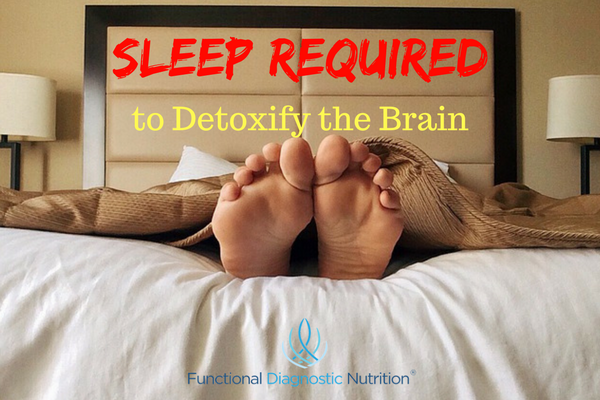Most people would agree that getting adequate sleep each night is a vital part of overall health. And while we are still learning more about the ways that the body benefits from optimal sleep, recent research is beginning to show the need for proper sleep in order to detoxify the brain.
Throughout our day the body circulates needed nutrients as well as oxygen throughout our body using our circulatory system. Waste products that are the result of metabolic processes are then absorbed by the lymph nodes. The waste is then moved into the lymphatic system where it is finally filtered out of the body. The lymphatic system is the body’s natural waste disposal system. The lymphatic system does not have a pump, such as the heart for the circulatory system. But movement of the lymphatic system occurs when we move our bodies through exercise or when we engage in deep breathing.
But scientists have been perplexed at how toxins were being removed from the brain. The lymphatic system does not extend to the spinal column or the brain itself. In fact, the brain is a completely closed off system. Without a connection to a known detoxification pathway such as the lymphatic system, scientists did not understand how waste was being filtered out of the brain itself. .
However, researchers discovered a previously unrecognized detoxification system in the brain that has been dubbed the glymphatic system. During sleep, the structure of the brain changes, and brain cells shrink by as much as 60%. This reduction in the size of brain cells allows for the easy flow of cerebralspinal fluid through the brain. Since many scientists believe that toxins collect in the space between brain cells, the free flowing cerebralspinal fluid helps to wash away any toxic waste that has gathered in that space.
The study, conducted by researchers at the University of Rochester Medical Center’s Center for Traslational Neuromedicine has uncovered the brain’s glymphatic system and the process of detoxification within the brain and shows the importance of quality sleep for brain detoxification.
In the report, which was originally published in the journal Science, lead study author Maiken Nedergaard, M.D., D.M.Sc. reports:
We here report that sleep has a critical function in ensuring metabolic homeostasis. Using real-time assessments of tetramethylammonium diffusion and two-photon imaging in live mice, we show that natural sleep or anesthesia are associated with a 60% increase in the interstitial space, resulting in a striking increase in convective exchange of cerebrospinal fluid with interstitial fluid. In turn, convective fluxes of interstitial fluid increased the rate of β-amyloid clearance during sleep. Thus, the restorative function of sleep may be a consequence of the enhanced removal of potentially neurotoxic waste products that accumulate in the awake central nervous system.
The glymphatic system is not active during waking hours. It is when the body is in a state of sleep, or under anesthesia that this internal housecleaning is being done in the brain.
So what happens to your body and your health when you don’t get adequate, quality sleep?
- Your body can’t release growth hormone, which help to repair tissue and cellular damage.
- It can impact your cognitive functioning because your brain simply cannot function properly.
- Your risk of death from all causes increases by approximately 15%.
- Both short term and long term memory can be impaired.
- You can become more moody or overly emotional.
- Your immune system cannot function properly and you face an increased risk of catching colds and flu more easily.
- Recovery time from illness can increase.
- Can contribute to weight gain and is a risk factor for obesity.
- Increases risk for type 2 Diabetes.
- Increases risk of high blood pressure, heart disease and stroke.
- Contributes to problems with balance and coordination and increases risk of falls.
- Chronic illnesses such as Alzheimer’s, Multiple Sclerosis and Parkinson’s Disease may actually be exacerbated.
Are these symptoms of sleep deprivation linked to toxin buildup in the brain?
Although it is possible that there is a connection between improper brain detoxification due to sleep deprivation, it is too early to tell. No research has been done yet to show a connection between the two. But because we do know about the connection between healthy detoxification in the body and chronic illness, it is safe to assume that the brain simply cannot function optimally without adequate detoxification.
One of the elements of working with a certified FDN practitioner is the help restore quality sleep. If sleep is an issue for you, contact an FDN practitioner today!







